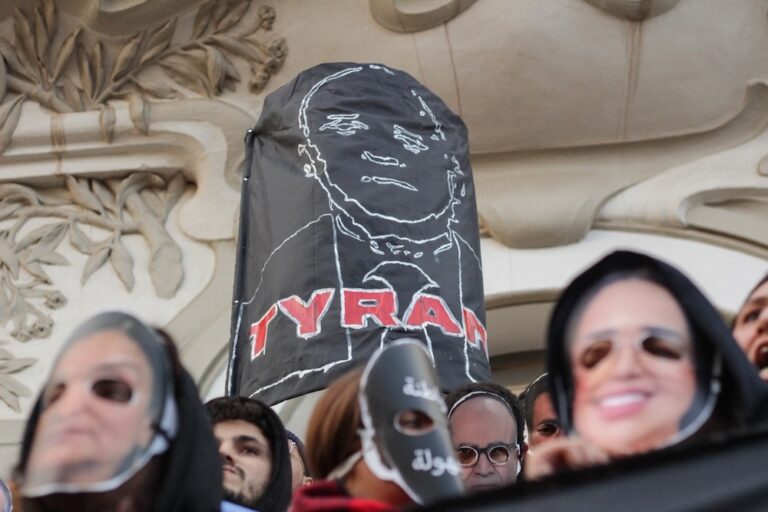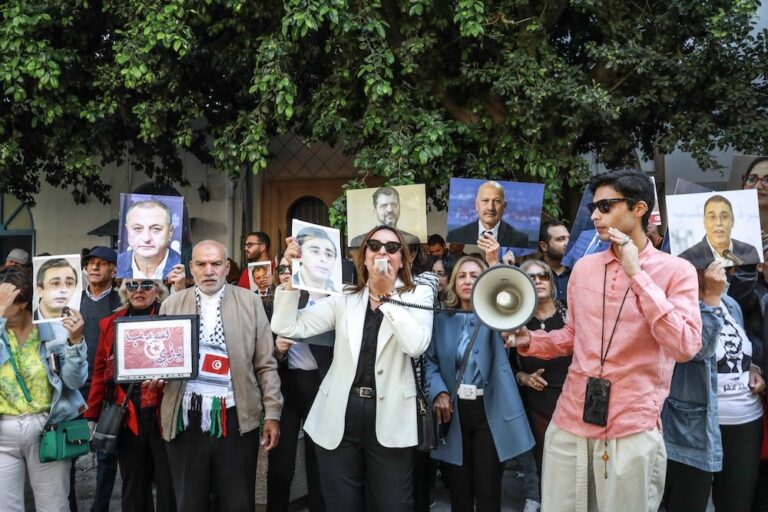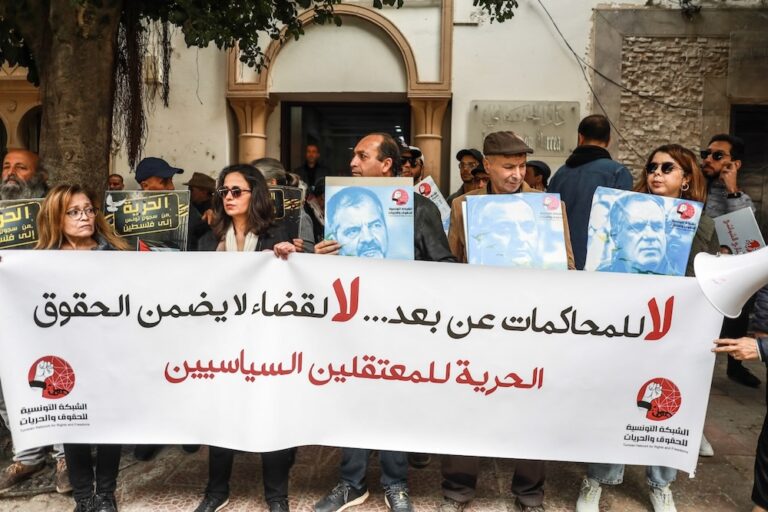(RSF/IFEX) – Sihem Bensedrine was arrested at the Tunis airport upon her return from France on 26 June 2001. She was placed under a committal order and incarcerated at the prison for women in Manouba (a western suburb of Tunis). She is accused of having broadcast “false news with an aim towards disturbing public order” […]
(RSF/IFEX) – Sihem Bensedrine was arrested at the Tunis airport upon her return from France on 26 June 2001. She was placed under a committal order and incarcerated at the prison for women in Manouba (a western suburb of Tunis). She is accused of having broadcast “false news with an aim towards disturbing public order” in remarks she made on the London-based television station Al Mustaquilla on 17 June. RSF has appealed to the Tunisian authorities for Bensedrine’s immediate release.
“We ask President Ben Ali to confer with the relevant authorities so that all the charges against her are dropped. This imprisonment is simply shameful. Not content to have censorship and self-censorship prevail over (both public and private) Tunisian media outlets, the regime is unscrupulously attacking all those who dare speak out in foreign media. It is a sign of utter contempt for freedom of expression. And if Al Mustaquilla’s programmes are so popular in Tunisia, it can only be proof that Tunisian media are incapable of contributing information worthy of its name. Everyone knows that the Tunisian press is completely subserviant to the authorities,” stated RSF Secretary-General Robert Ménard.
According to information collected by RSF, Bensedrine, editor of the online magazine “Kalima”, secretary-general of the Observatory for the defence of freedom of the press, publishing and creation (Observatoire pour la défense de la liberté de la presse, de l’édition et de la création OLPEC, affiliated with RSF’s international network) and spokesperson for the National Council for Liberties in Tunisia (Conseil national pour les libertés en Tunisie, CNLT), was detained on 26 June, at approximately 10:00 a.m. (local time), at the Tunis airport, upon her flight’s arrival from Marseille. She was accompanied by a representative of the organisation Lawyers Without Borders (Avocats sans frontières) and the head of Marseille City Hall’s Socialist Group. While members of her family thought that she was brought before an examining judge, once they arrived at the tribunal, they realised that the journalist was not there. The state prosecutor and several examining judges told them that there was “no legal action brought against her,” and that she had not been detained. Shortly thereafter, an official source quoted by Agence France-Presse clarified that “a judicial inquiry was ⦠launched against her. A commission at the judicial police was asked to lead the necessary investigation towards presenting [the journalist] before Tunis’ state prosecutor.” Contacted by RSF on 26 June, in the late afternoon, lawyer Radhia Nasraoui stated that the examining judge had ordered the journalist’s arrest. She was taken to the prison for women in Manouba (a western suburb of Tunis). She is to appear before the examining judge on 5 July.
In June, a summons was issued against the journalist. These legal proceedings were initiated a few days after Bensedrine’s appearance on the London-based Arab television station Al Mustaquilla, on 17 June. On the programme “Le Grand Maghreb”, she notably raised the issue of corruption in Tunisia. Bensedrine is being prosecuted for “defamation” and “undermining the judicial institution”. On 15 December 2000, the journalist found that her car had been searched. A knife had been placed in the back seat of her car, as well as a note containing threats (see IFEX alert of 18 December 2000).
In recent months, Al Mustaquilla, and particularly its director, Mohammed el Hachmi Hamdi, have been receiving telephone threats from Tunisia. The television station regularly invites Tunisian opposition figures to the set of “Le Grand Maghreb”. Guests have included Khemaïs Chamari, Khemaïs Ksilla, Mohammed Charfi, Mokhtar Trifi, Moncef Marzouki, among others. “You are the source of the problems” and “we are in a state of war against you” are among the comments received recently by the station director. Yet, el Hachmi Hamdi has also invited Tunisian officials to participate in the programme. But according to him, all those who were contacted declined his offer, saying: “We do not debate with people whom we do not respect.” Following Bensedrine’s 17 June appearance on “Le Grand Maghreb”, she received more threats. The authors of the threats demanded that el Hachmi Hamdi issue an on-air apology. In case he refused, they threatened to blow up the station’s studios. They also added that they were prepared to spend large sums of money to prosecute the station in British courts. In the last month, the station director has been the target of a slander campaign in certain Tunisian media outlets, notably in the private weekly “Ech Chourouk”. Several members of el Hachmi Hamdi’s family were recently summoned to the police station in Sidi Bouzid (in the country’s central region). “My family is currently being held hostage,” Al Mustaquilla’s director told RSF.


